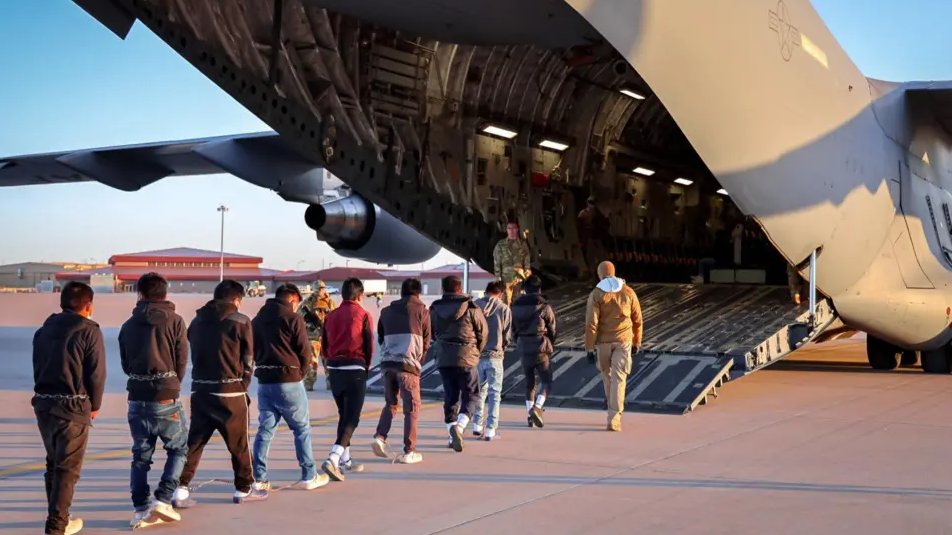
US and Colombia agree on deportations; tariffs and sanctions are suspended
After the White House announced on Sunday that Colombia had agreed to take military planes transporting deported migrants, the United States and Colombia backed up from the verge of a trade war.
Earlier, as part of his broad immigration crackdown, U.S. President Donald Trump had threatened Colombia with taxes and fines for refusing to accept military planes carrying deportees.
In a statement released late Sunday, however, the White House claimed Washington would not enforce the fines it had threatened and that Colombia had finally agreed to take in the migrants.
“The Government of Colombia has agreed to all of President Trump’s terms, including the unrestricted acceptance of all illegal aliens from Colombia returned from the United States, including on U.S. military aircraft, without limitation or delay,” stated the statement.
Unless Colombia violates this agreement, draft directives imposing tariffs and penalties on the country will be “held in reserve, and not signed,” the statement continued.
“Today’s events demonstrate to the world that America is once again respected.” According to the White House statement, President Trump “expects all other countries in the world to fully cooperate in accepting the deportation of their citizens who are illegally present in the United States.”
Colombian Foreign Minister Luis Gilberto Murillo declared in a statement late Sunday that “we have overcome the impasse with the U.S. government.”
“The government of Colombia … has the presidential plane ready to facilitate the return of Colombians who were going to arrive in the country this morning on deportation flights.”
The message did not directly contradict the White House release, but it did not mention that military planes were part of the arrangement.
In the upcoming days, Murillo and Colombia’s ambassador to the US will visit Washington to follow up on agreements that resulted in the two governments exchanging diplomatic notes, the Colombian statement further said.
A travel ban and the revocation of Colombian government officials’ visas, emergency treasury, banking, and financial penalties, and 25% tariffs on all Colombian commodities entering the United States—which would rise to 50% in a week—are all part of Washington’s proposed measures, which are now on hold.
Trump also threatened to implement more thorough border checks on Colombian goods and citizens. The United States has halted visa processing at the U.S. embassy in Bogota, a State Department official said ahead of the announcement of a deal on the flights.
The third-biggest commercial partner of the United States in Latin America is Colombia.
A 2006 free trade pact that produced $33.8 billion in two-way commerce in 2023 and a $1.6 billion U.S. trade surplus made the U.S. Colombia’s top trading partner, according to U.S. Census Bureau data.
According to Alejo Czerwonko, chief investment officer for emerging markets Americas at UBS Global Wealth Management, around 4% of Colombia’s GDP, or one-third of its exports, depend on access to the U.S. market.
The military deportation planes were already denounced by Colombian President Gustavo Petro, who also said that he would never conduct a raid to bring shackled Americans back to the United States.
“We are the opposite of the Nazis,” he expressed in a post on the social networking site X.
In addition, he offered his presidential jet to help with the “dignified return” of deported migrants and stated that Colombia would welcome them home on private aircraft.
“DEGRADING TREATING”
Trump has implemented a crackdown since taking office last Monday and has proclaimed illegal immigration a national emergency.
In addition to issuing a sweeping prohibition on asylum and taking action to limit citizenship for children born in the United States, he instructed the U.S. military to assist with border security.
Deportation flights are not often conducted by U.S. military planes. On Friday, U.S. military planes flew to Guatemala twice, carrying around 80 migrants each.
Last week, Mexico denied permission for a U.S. military plane carrying migrants to land.
To compel more action against illegal immigration and fentanyl entering the United States, Trump has stated that he is considering putting 25% taxes on imports from Canada and Mexico on February 1.
aboard Saturday, when migrants were shackled aboard a commercial deportation aircraft, Brazil’s foreign ministry denounced “degrading treatment” of Brazilians. Upon arrival, press sources also indicated that several passengers had been mistreated throughout the journey.
Originally, the jet was supposed to land in Belo Horizonte, in the southeast state of Minas Gerais, with 88 Brazilian passengers, 16 U.S. security officers, and eight crew members.
However, the government said in a statement on Saturday that Brazilian officials ordered the handcuffs to be removed at an unplanned stop in Manaus, the capital of Amazonia, due to technical issues. President Luiz Inácio Lula da Silva then designated a Brazilian Air Force (FAB) flight to finish their journey.
According to Brazil’s federal police, the commercial charter aircraft was the first since Trump’s presidency and the second from the United States this year transporting illegal migrants deported back to Portugal.
Regarding Brazil, U.S. officials did not respond to calls for comment.
All Categories
Recent Posts
Tags
+13162306000
zoneyetu@yahoo.com



